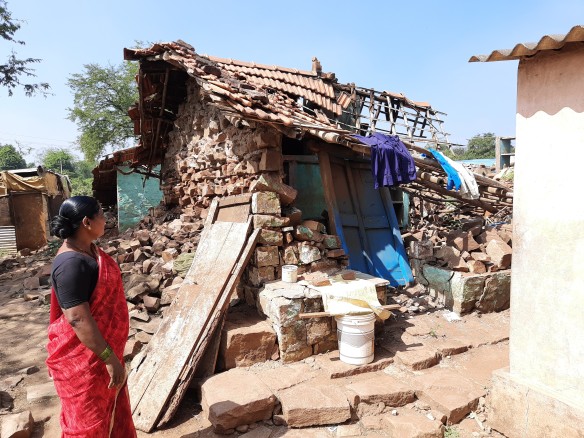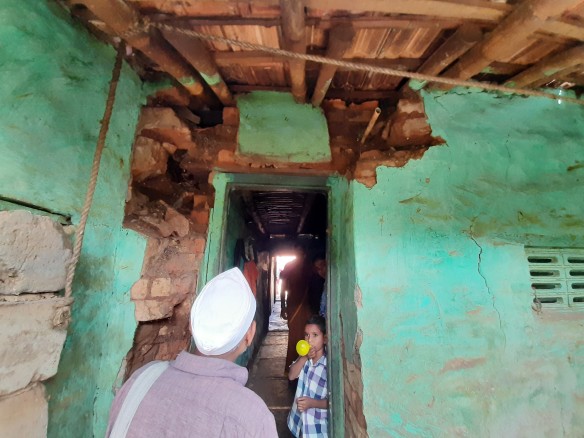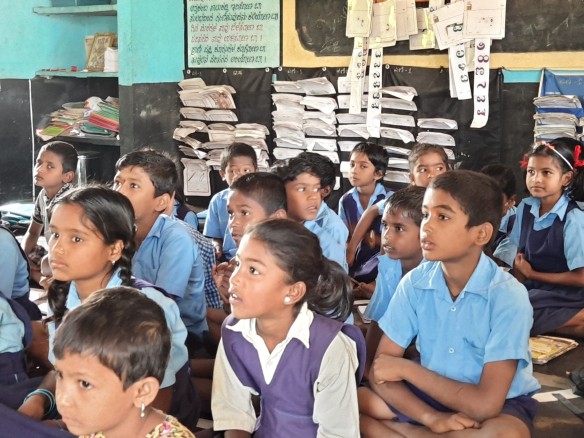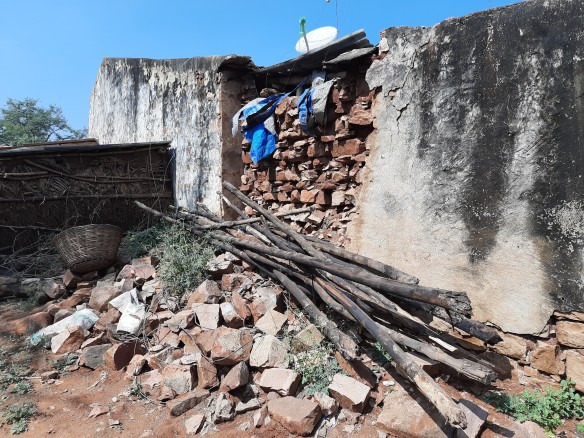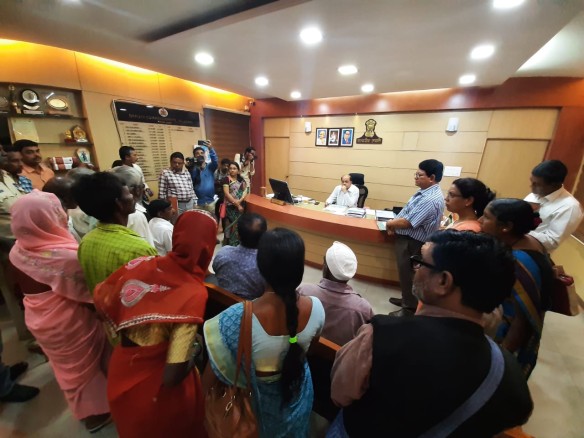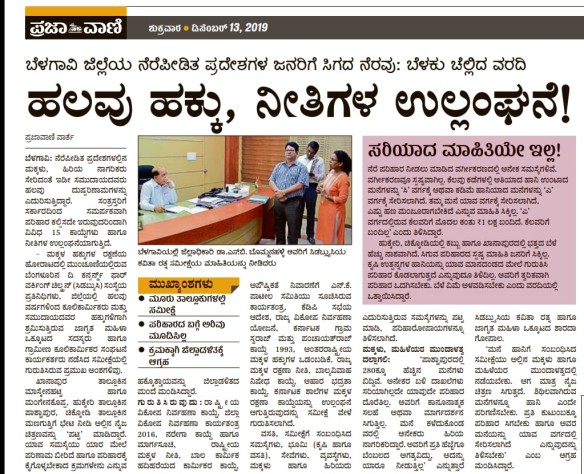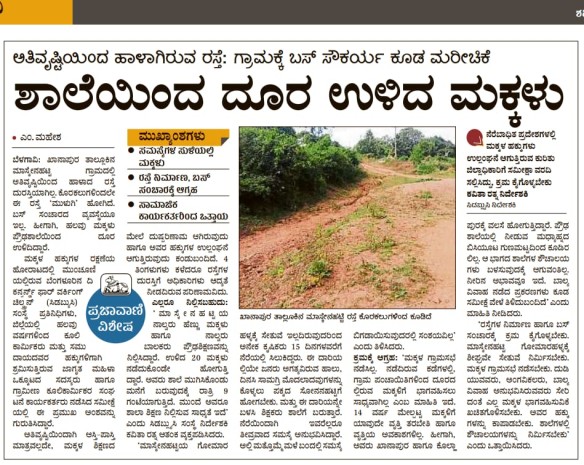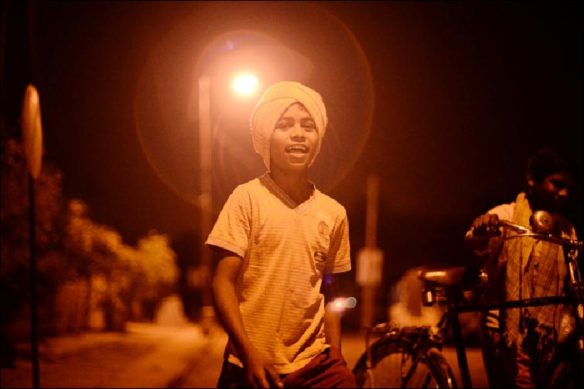Fact finding visits to flood-affected areas in Belagavi district to expose violations of the rights of children and affected families
Posted on December 20, 2019
The Concerned for Working Children visited 2 out of the 4 taluks, that were severely affected by the flood: Hukkeri, Chikkodi, Khanapur and Gokak. Our team visited Khanapur and Hukkeri taluks to study the extent of damage caused due to heavy rains and flooding. Most of the communities here are dependent on agricultural lands for their livelihood as farmers or as labourers. But rainfall and the flood have destroyed their agricultural lands extensively, with unprecedented rainfalls and flooding.
Schools and anganwadis are in shambles and many of their rooms are unusable. Many houses are badly destroyed and are unfit to live in. The four criteria identified by the government with regard to the damage faced are as follow: A – Complete damage; B – Roof damage; C – Minimum damage to walls and windows; D – Any noticeable damage. Rs. 25,000/- is offered to the houses with least damage. Some of the families we met have received 25,000/- as compensation amount based on government survey. The maximum limit for the compensation amount is Rs. 5,00,000/- and some of the families have received the first installment of Rs. 1,00,000/-.
People have raised the issue that their houses have been marked under the wrong category and thus received inadequate compensation amount. We saw examples of houses which are extensively damaged listed as category C or D. Many people do not have the information regarding which category their damaged property belongs to, or on what criteria. We have also observed that there was no clarity among the affected families regarding the next steps in claiming the compensation. Another crucial observation is houses that are fragile and vulnerable to damage do not feature in the list of categories and are not marked for repair and reinforcement. This is likely to lead to extensive damage to property and life in case of recurrence of heavy rains.
Also, some families are left out from lists entirely even though their houses are completely damaged. More than the government stepping in, individual donors have come forward to support flood victims with immediate effect. The response from the government to rebuild the community and their lives have been very slow and ineffective. It was observed that the gram panchayats had been unresponsive and lacked a robust plan of action for rebuilding the community. Some of these locations had been identified as risk-prone in the past and some of the people there had been provided alternate sites. However many of them had not received the rights of records of such sites/lands/houses and hence had continued to live here. Their houses are now affected, but they will not be considered for compensation.
In most of the places that we visited, communities and the children had no disaster warning and had to rush out of flooding homes in the middle of the night, with no electricity and through gushing waters to find safety. Floods have not only affected thousands of acres of agricultural lands but also agricultural produce stocked up after harvesting. No specific compensative schemes/programmes are planned yet for children, women or senior citizens affected by the flood. People are still in temporary shelters and relief camps even after three months of being affected by the flood. Health support systems and non-existent or highly inadequate. The Additional Officer, in-charge of the office of Executive Officer and holding the special charge of NREGA mentioned to the team that their disaster management guidelines have not been updated 2015.
The present guidelines are largely applicable to drought-prone areas and not flood-affected regions. The discussion with the NREGA Commiserate in Bangalore also reinforced this. There are no special provisions under NREGA scheme for the post-flood reconstruction. The psychological, social and economic trauma children and their families face is immeasurable and the question as to who will help the affected families reconstruct their lives from scratch still remains unanswered. With everything gone and washed out, families are still recovering from the shock and horror of the loss due to the floods. They do not know whom to turn to and absence of accountable government response – locally and from the state-level administration response is glaring.
Press Conference to expose the violation of rights of children and affected families due to severe floods in Belagavi district and Meetings with DC and CEO of Belagavi district:
A press interaction was held on 12th December 2019 at the gates of the District Administration. We had excellent media coverage from State and Regional Newspapers and news channels. Prajavani has covered detailed stories post the press conference, publishing our fact-finding observations and reporting the violations of several laws.
We are glad to note that as a result of the press conference, in Maskenahatti panchayat, work has begun on road repair and construction. This was one of the main issues that children had raised as the damaged roads had forced 8 children to drop out of PUC and 20 others were likely to follow suit.
Press interaction was followed by our meeting with the Deputy Commissioner of Belagavi district, Mr. S B Bommanahalli. We raised specific violations and observations. He made note of several cases for follow up, asked for details in a few, asked CDPO present there to visit one of the villages regarding an Anganwadi related complaint. He promised to discuss some of the matters with the CEO. He mentioned that 86 crores had been disbursed and community members contested it sharply. He had no response regarding the absence of a District Disaster Management strategy.
We next met with the CEO, Dr. Rajendra and discussed with him specifics from our observations. He asked for further details for follow up and our local partners will follow up the matter with their local constituencies. He has assured us that he will work with the office of DC to follow up. He was extremely attentive and concerned. We also discussed with him about how Makkala Grama Sabhas are not accessible to many children in far-flung hamlets, how they exclude working children, adolescents and young persons who are most vulnerable in every way. He was quick to accept the failure of ensuring the participation of most vulnerable children. He not only promised to issue specific guidelines related to Makkala Gram Sabhas based on all points raised to the entire district, but he also requested us to prepare a presentation about Makkala Grama Sabha and their effective implementation to be presented at a video conference for all PDOs of Belavagi. This Video Conference was held on December 17th and 100 PDOs of Belagavi district took part in it and our local partner, JMO made the presentation on our collective behalf.
Read the detailed letter addressed to the Deputy Commissioner, Belagavi district here: Letter to DC Belgavi 12-12-2019 (FINAL)
Read the detailed press note here: BelagaviPressNote_12Dec2019_CWC
Read the Press Coverage here:
Prajavani (Belagavi Edition):
